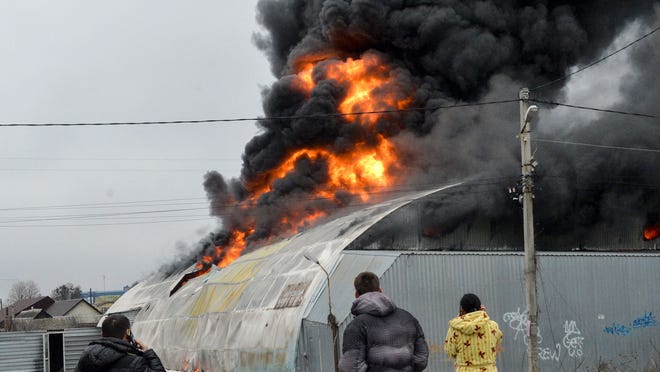Authorities in Ukraine said Friday that a fire at Europe’s largest nuclear plant after enduring heavy shelling from Russian forces in the southern of Enerhodar has been extinguished.
In a statement, Ukraine’s regional military administration said there was damage to the compartment of reactor No. 1 at the Zaporizhzhia plant in the city of Enerhodar, but it does not affect the safety of the power unit, adding that operational personnel are ensuring its safety.
No information was immediately available about casualties. Ukrainian officials said that radiation levels in the area weren’t at dangerous levels.
U.S. Energy Secretary Jennifer Granholm said late Thursday that she had spoken to her counterpart in Ukraine, and said the “plant’s reactors are protected by robust containment structures and reactors are being safely shut down.”
A White House official said President Joe Biden spoke with Ukraine President Volodymyr Zelenskyy on Thursday about the situation at the nuclear plant. The latest information shows no indications of elevated levels of radiation, but officials are monitoring the situation closely, the official said.
In an emotional speech in the middle of the night, Zelenskyy said he feared an explosion that would be “the end for everyone. The end for Europe. The evacuation of Europe.”
“Only urgent action by Europe can stop the Russian troops,” he said. “Do not allow the death of Europe from a catastrophe at a nuclear power station.”
The assault renewed fears that the invasion could damage one of Ukraine’s 15 nuclear reactors and set off another emergency like the 1986 Chernobyl accident, the world’s worst nuclear disaster, which happened about 65 miles north of the capital.
British Prime Minister Boris Johnson called for an emergency meeting of the U.N. Security Council in “coming hours” to raise the issue of Russia’s attack on the nuclear power plant, according to a statement from his office.
Quick links:
GET THE LATEST UKRAINE UPDATES:We’ll email you the latest news once a day.
ON THE BORDER:Ukrainian refugees describe harrowing journey to Poland
MAPPING AND TRACKING RUSSIA’S INVASION:See the latest on troop movements
Latest developments:
►On Thursday, Ukraine said it has agreed with Russia to create safe corridors backed by cease-fires to evacuate civilians and deliver aid as the parties engaged in a second round of negotiations amid Russia’s ferocious assault on its neighbor.
►The Pentagon said it established a direct communication line Tuesday with the Russian ministry of defense “for the purpose of preventing miscalculation, military incidents, and escalation.”
►French President Emmanuel Macron spoke by phone with Russian President Vladimir Putin for 90 minutes and now believes “the worst is yet to come,” a Macron aide told France24. Putin reportedly vowed to conduct an “uncompromising fight” in Ukraine.
►Acclaimed soprano Anna Netrebko has withdrawn from her upcoming New York performances after not complying with the Metropolitan Opera’s condition that she repudiate her public support for Putin, the Met said on Twitter.
►President Joe Biden, Australian Prime Minister Scott Morrison, Indian Prime Minister Narendra Modi and Prime Minister Fumio Kishida of Japan conferred via telephone, agreeing to a “channel for communication” as they address and respond to the crisis.
A CLOSER LOOK AT SANCTIONS:Where US, allies have targeted the dozens of sanctions against Russia
Fire at nuclear power plant sparks fears of ‘Fukushima-style meltdown’
Fears of an unprecedented nuclear disaster spread rapidly overnight when part of Europe’s largest nuclear plant caught on fire as Russian forces shelled the area.
Amid a stream of confusing, alarming, and, at times, conflicting information about the incident, The International Atomic Energy Agency soon said the “serious situation” had not affected essential equipment at the Zaporizhzhia Nuclear Power Plant and that there had been no change in radiation levels.
Jon B. Wolfsthal, former senior director for arms control and nonproliferation at the National Security Council, tweeted that the Zaporizhzhia power plant was “inherently more safe and protected than the Chernobyl.”
James M. Acton, co-director of the Nuclear Policy Program at the Carnegie Endowment for International Peace. echoed Jennex’s assessment of the danger posed by the Russian attack, saying the fire could result in a “Fukushima-style meltdown.”
In that nuclear incident in Japan, a massive earthquake and tsunami in 2011 destroyed the Fukushima plant’s cooling systems, triggering the meltdown of three reactors and the release of large amounts of radiation, and causing more than 160,000 people to evacuate.
The Chernobyl disaster, while geographically close, was caused by a different process, Acton told USA TODAY. It was caused by operator error and led to a different level of danger — a situation where the nuclear fuel explodes. Read more here.
— Joel Shannon
White House sanctions Russian oligarchs, freezes their assets
The Biden administration on Thursday announced a new round of sanctions on several Russian oligarchs and their families as the U.S. and allies continue to pressure Russia to stop its assault on Ukraine.
The White House said officials are working with governments across the globe to identify and freeze the assets of Russian elites and their family members – including yachts, luxury apartments and money – in each country’s respective jurisdictions.
Those being sanctioned include, Dmitry Peskov, President Vladimir Putin’s press secretary, as well as Alisher Usmanov, owner of one of the world’s largest yachts and Russia’s largest privately owned aircraft. The yacht was recently seized by Germany. The White House called Usmanov “a close ally of Putin.’‘
The Biden administration is also imposing travel restrictions on 19 Russian oligarchs and their 47 family members and close associates. According to the White House, those oligarchs are known for directing, authorizing, funding or supporting Russia’s foreign policy. The administration has taken steps to place visa restrictions on the group.
President Joe Biden said the sanctions are cutting off Russia’s access to technology and the global financial system, and that they are having a deep impact.
“The goal is to maximize the impact on Putin and Russia and minimize the harm and loss to our allies and friends around the world,” Biden said. “Our interest is in maintaining the strongest unified economic impact campaign on Putin in all history.”
– Rebecca Morin
Former Fox producer charged with violating sanctions against Russia for its 2014 takeover of Crimea
Former Fox News producer Jack Hanick was charged with sanctions violations and lying to the FBI in the first such indictment arising from sanctions over Russia’s annexation of Crimea from Ukraine in 2014, the Justice Department said Thursday.
According to court documents unsealed in federal court in Manhattan, the 71-year-old Hanick worked for years for Konstantin Malofeyev even after the Russian oligarch was sanctioned for financing Russians promoting separatism in Crimea and elsewhere in Ukraine.
The indictment said Hanick, a U.S. citizen, “knowingly chose to help Malofeyev spread his destabilizing messages by establishing, or attempting to establish, TV networks in Russia, Bulgaria and Greece, in violation of those sanctions.”
The indictment comes a day after Attorney General Merrick Garland announced the launch of a task force dedicated to enforcing the sweeping sanctions and restrictions the U.S. and its allies have imposed for Russia’s invasion of Ukraine.
— Josh Meyer
Ukrainians in U.S. granted temporary protection from deportation
The Department of Homeland Security on Thursday announced temporary protected status for Ukrainians living in the United States, which will shield them from deportation for the next 18 months, as Ukraine continues to face ongoing attacks from Russia.
“Russia’s premeditated and unprovoked attack on Ukraine has resulted in an ongoing war, senseless violence, and Ukrainians forced to seek refuge in other countries,” Homeland Security Secretary Alejandro Mayorkas said in a statement. “In these extraordinary times, we will continue to offer our support and protection to Ukrainian nationals in the United States.”
Individuals must have continuously lived in the U.S. since March 1 to be eligible for TPS, DHS said. That would apply to approximately 30,000 Ukrainian nationals. Those who attempt to travel to the U.S. after March 1 do not qualify for TPS.
— Rebecca Morin
Russia hammering Ukraine’s southern cities
Ukraine’s major cities have come under heavy bombardment, a senior Defense Department official said. About 90% of the 150,000 combat forces Putin deployed to Ukraine’s borders are now inside the country, said the official, who described military movements on condition of anonymity.
Heavily populated southern cities along the Black Sea and Sea of Azov were among primary targets as Russia’s campaign threatened to cut off shipping. Hennadiy Lahuta, governor of Kherson Oblast, said the government building in the Black Sea port city of Kherson, with a population of almost 280,000, was seized by Russian troops. Units were also bearing down on Mykolaiv, 40 miles to the northwest and home to almost half a million Ukrainians, The New York Times reported. U.S. officials said Russia had fired 480 missiles at Ukraine.
Russian forces failed to capture Mariupol, a city of 450,000 on the Azov Sea, and had “resorted to a blockade, creating a humanitarian disaster,” the Ukrainian military said. Food, water and even electricity have been cut off, women and children halted from evacuating. In the vital energy-producing southern city of Enerhodar, a hub on the Dnieper River, Ukrainian forces were battling Russian troops on the city’s outskirts, Mayor Dmytro Orlov said.
The Ukraine military said four large landing ships and three missile boats were moving through the Black Sea in the direction of the Odesa and its 1 million residents. Russian sailors were firing on civilian ships and taking prisoners, according to the military.
Russia has acknowledged that nearly 500 of its troops have been killed in the war and about 1,600 wounded. Ukraine, which has not released casualty figures for its own armed forces, has estimated Russian troop losses at up to 9,000.
Ukraine’s State Emergency Service has said more than 2,000 civilians have died, though it was impossible to verify the claim. The U.N. human rights office said it had recorded 227 deaths, including 15 under age 18, and 525 injured, since the start of the invasion on Feb. 24.
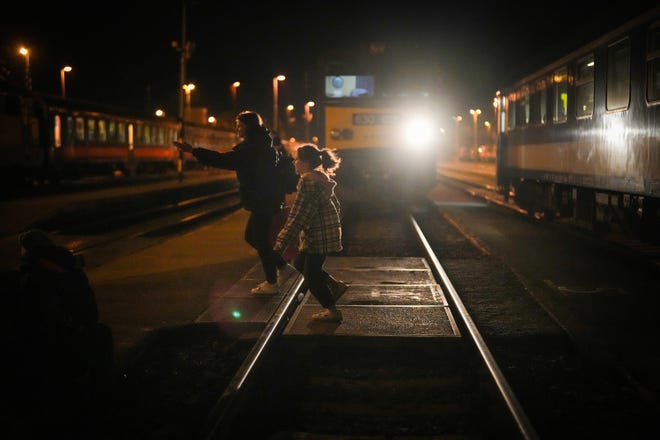
Zelenskyy says 16,000 foreign volunteers have answered call to fight for Ukraine
Ukraine has sent out a call for foreign volunteers to join its fight against the Russian invaders, and President Volodymyr Zelenskyy said there has been a strong response.
In a video posted online, Zelenskyy said the first 16,000 fighters from other countries “are already on their way to protect freedom and life for us, and for all.”
While many governments are limiting their involvement in the war to sending weapons and other forms of aid, which Zelenskyy expressed gratitude for, others have gone a step further.
The Czech Republic said Thursday it won’t get in the way of its citizens who decide to join international brigades to help Ukraine. Serving in a foreign army is punishable by a prison term in the Czech Republic, but Prime Minister Petr Fiala said those who fight for Ukraine in this war would be pardoned by President Milos Zeman, with him co-signing it.
Congressmen want oligarchs’ assets ‘repurposed’ to benefit Ukraine
Reps. Tom Malinowski (D-NJ) and Joe Wilson (R-SC) introduced a bipartisan bill on Thursday to seize any assets from oligarchs whose wealth is linked to the corruption of Vladimir Putin’s repressive regime and “repurpose” them to help Ukraine.
The legislation authorizes the Biden administration to confiscate any property – including luxury villas, yachts and airplanes – valued over $5 million from Russian oligarchs previously sanctioned by the U.S. government for their involvement in the Kremlin’s invasion and human rights violations in Ukraine.
Any funds gained from asset sales must then be used to benefit the Ukrainian people through the provision of military and humanitarian assistance, post-conflict reconstruction and technology to ensure the free flow of information in Ukraine, the two lawmakers said.
— Josh Meyer
White House seeks $10 billion for Ukraine
The White House on Thursday requested $10 billion from Congress to aid Ukraine. Much of the aid to Ukraine would be used to support the country’s military in its fight against the Russian invasion, though a significant portion would also go toward humanitarian assistance for Ukrainians fleeing violence or who have been made food insecure by the attack.
“To continue this important work and further support the Ukrainian people, we are requesting $10 billion to deliver additional humanitarian, security, and economic assistance in Ukraine and the neighboring region in the coming days and weeks,” Shalanda Young, director of the White House Office of Management and Budget, wrote in a blog post.
– Matthew Brown
1 million have fled in ‘swiftest exodus this century’
More than 1 million people have fled the fighting. The mass evacuation could be seen in Kharkiv, where residents desperate to escape falling shells and bombs crowded the city’s train station and pressed onto trains, not always knowing where they were headed. The Ukrainian government said at least 34 people were killed and 285 injured, including 10 children, during the shelling of Kharkiv.
In one week, more than 2% of Ukraine’s population has been forced out of the country, according to a tally from the United Nations, which called the mass flight one of the “swiftest refugee exodus this century.”
Putin siege tactics could bring mass destruction, death to Ukraine
Putin’s military forces seem poised to adopt siege tactics that could result in enormous civilian deaths and infrastructure damage after their initial assault has failed to topple the Ukrainian government, officials and experts say. The Ukrainian cities of Kyiv, Kharkiv and Mariupol have come under heavy bombardment from airstrikes and artillery – similar to tactics Putin used in Syria and Chechnya.
“A siege is likely and may last as long as several weeks,” said Sen. Richard Blumenthal, D-Conn., a member of the Armed Services Committee. “He’ll try to wear down resistance in Kyiv and Kharkiv and other major cities, hitting civilian centers with massive explosives, airstrikes and missiles.” Read more here.
– Tom Vanden Brook
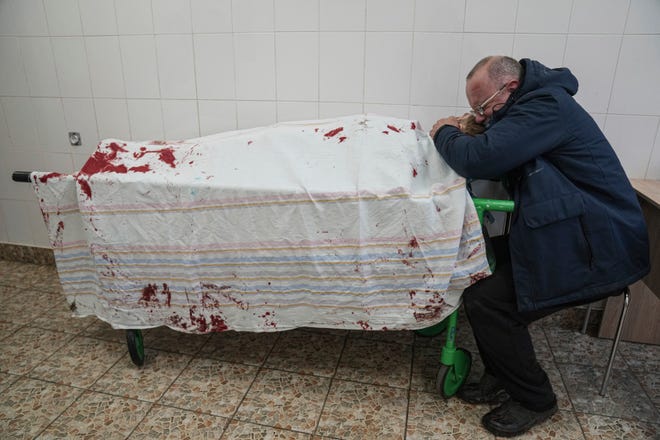
Putin nuclear talk sparks run on iodine pills
Fighting in the vicinity of the former Chernobyl nuclear reactor in Ukraine followed by news Sunday that Russian President Vladimir Putin had put his nuclear arsenal on alert has prompted a rush on iodine in some European countries. In Belgium, Pharmacists’ Union’s Michael Storme told the press agency Belga that druggists there had given away 30,000 packs of iodine tablets Monday alone. Some pharmacies in Finland were running out of iodine tablets, which can protect the thyroid gland from the effects of radiation.
The U.S. Nuclear Regulatory Commission notes that it is a “very specialized protection” and says evacuation is the most effective measure because it “protects the whole body from all radionuclides and all exposure pathways.”
Zelenskyy: Russian soldiers are ‘confused children’
In a video address to the nation early Thursday, Ukrainian President Volodymyr Zelenskyy called on Ukrainians to keep up their resistance but didn’t comment on whether the Russians have seized any cities.
“They will have no peace here,” Zelenskyy said, calling on the Russian soldiers to “go home” and describing them as “confused children who have been used.” He said that for Ukrainians this was a patriotic war that won’t end until the Russians have been driven out.
“Wherever they go they will be destroyed,” Zerenskyy said. “They will not have one quiet moment. The occupiers will receive only one thing from Ukrainians – resistance. Fierce resistance.”
Black and brown refugees are being turned away at European borders
As increasing reports indicate people of color fleeing Ukraine are facing discrimination at the border, the crisis has once again highlighted a double standard in the way nations treat refugees based on country of origin, race, religion and more, academics and refugees say.
Many of the same European nations that turned away refugees from the Middle East, Africa and Asia in the past are now largely welcoming refugees from Ukraine.
“It’s great that Europe is being welcoming toward Ukrainian refugees. That should be the response,” said Nell Gabiam, an associate professor at Iowa State University who studies forced migration. “But it would be even better if that response was applied across the board toward all refugees who are fleeing persecution and war.”
Filippo Grandi, United Nations High Commissioner for Refugees, commended governments and citizens for their “extraordinary acts of humanity and kindness” but acknowledged some refugees have faced “a different treatment” at the border. Read more here.
– Grace Hauck
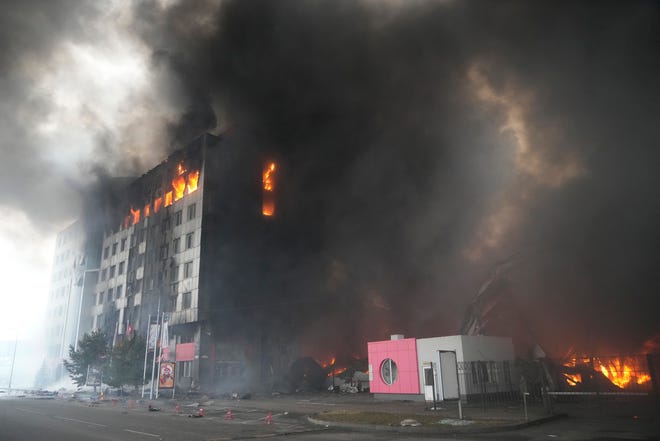
US colleges denounce Russia, pull out of country
Some American colleges are joining the growing Western coalition of governments and businesses taking action against Russia – an unusual position for academia, which generally tries to stay out of international politics.
The response from U.S. universities has ranged from denouncements of Russia’s actions to shutting down academic partnerships and programs in Russia.
The Massachusetts Institute of Technology has taken the most drastic, severing ties with a Russian university it helped to found. And on Monday, the Department of State urged all Americans to leave Russia, which could affect some collegians studying abroad.
The developments are especially striking given that universities celebrate their openness to cultural exchange, even with controversial governments such as China or Saudi Arabia. But Russia’s invasion of Ukraine is testing how far the commitment to intellectual diversity can go in the face of war. Read more here.
– Chris Quintana
WHO: ‘Much more likely’ COVID will spread in Ukraine now
The World Health Organization said Wednesday that the ongoing invasion of Russian forces in Ukraine will allow COVID-19 to spread easily across the country, concerning health officials that the situation will result in many cases going undetected as attacks are made on healthcare facilities.
“You disrupt society like this and literally millions of people on the move, then infectious diseases will exploit that,” Mike Ryan, director of the World Health Organization’s Health Emergencies Program, said during a news briefing. “(People are) highly susceptible to the impacts of, first of all, of being infected themselves, and it’s much more likely that disease will spread.”
Ukraine is coming off one of its worst waves of COVID-19 since the pandemic began, according to WHO data.
On Feb. 4, there were a record 43,778 positive cases reported, and although cases have continuously declined since then, the war could result in the virus easily spreading without tests available. Only 34% of the country’s population is fully vaccinated, according to WHO data.
– Jordan Mendoza
Biden banned Russia from US airspace. Here’s what the area covers.
President Joe Biden announced the U.S. is closing off airspace to all Russian flights during his State of the Union address Tuesday, a decision with a sprawling geographic impact because of the numerous territories in the Pacific Ocean.
The move is a part of a global effort aimed at isolating Russia from the rest of the world. Cutting off Russian flights to the U.S. will impact airspace over the lower 48 states, Hawaii, Alaska and the American-controlled territories that expand across much of the Pacific Ocean.
Those territories include Palau and the Marshall Islands. And under the Compacts of Free Association, a series of treaties between the United States and those territories, the U.S. has access to and controls much of the airspace surrounding the islands.
– Celina Tebor
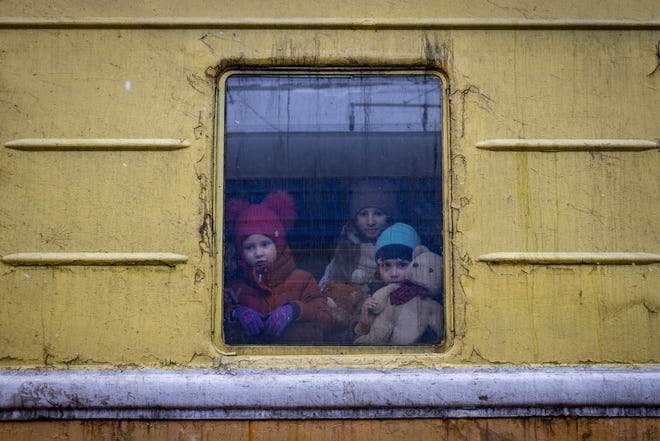
Report: China asked Russia to delay Ukraine invasion after Olympics
Senior Chinese officials told Russian officials back in February not to invade Ukraine before the end of the Winter Olympics in Beijing, The New York Times reported Tuesday.
The Times, citing a Western intelligence report and quoting senior Biden administration officials and a European official, said that the Chinese officials had “some level of direct knowledge about Russia’s war plans or intentions” before the invasion started last month.
Chinese President Xi Jinping met with Russian President Vladimir Putin in Beijing on Feb. 4 before the Winter Games kicked off in Beijing. According to the Times, it’s not clear if conversations about the invasion took place in the meeting between Xi and Putin.
After their meeting last month, both leaders issued a joint statement highlighting what they called “interference in the internal affairs” of other states, as Xi and Putin faced criticism from the United States over their foreign and domestic policies.
The relationship between China and Russia has grown over the past few decades, and the two nations opposed a further expansion of NATO. When Russia began its full-scale invasion of Ukraine on Feb. 24, China called for peace between the two countries and said the U.S. and its allies were worsening the conflict.
– Charles Ventura, Asha C. Gilbert
Contributing: Associated Press


